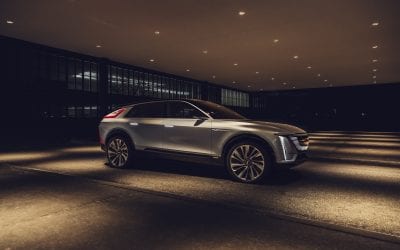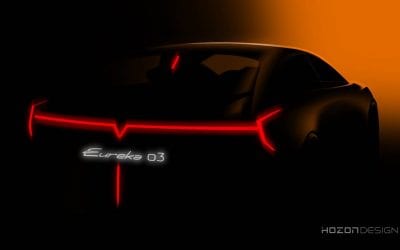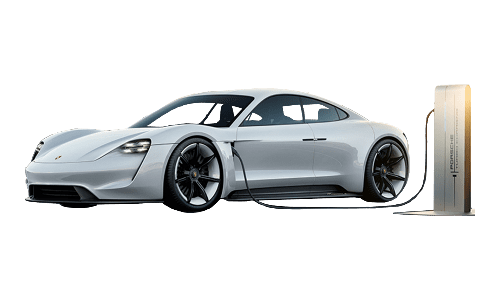GERMAN EV SALES
Global ranking, EV market share of national fleet
NO. 9
(Q4 2016 1.0%)
GERMAN EV INCENTIVES
Germany has joined the subsidy game later than other countries on this list, but their ambitious goals have cemented them into the third spot. At the beginning of 2016, Chancellor Merkel introduced a green car subsidy up to €5000 to boost BEV and plug-in hybrid sales.
This plan was implemented as of February 2016 and includes a 40% purchase subsidy paid by the German government which means private buyers would receive the full €5000 while corporate buyers would receive up to €3000. Incentives will decrease by €500 a year till the scheme has run its course. This scheme is planned to run until 2020, and the German government hopes to have 1 million electric vehicles on their roads by that time.
ANALYSIS OF GERMAN EV SALES DATA
Click through to our detailed breakdown of EV sales in Germany filled with charts, tables, and insights. We look at the Top EV brands in Germany, the gainers, the worst performing German EVs and the battle between BEV and PHEV models.
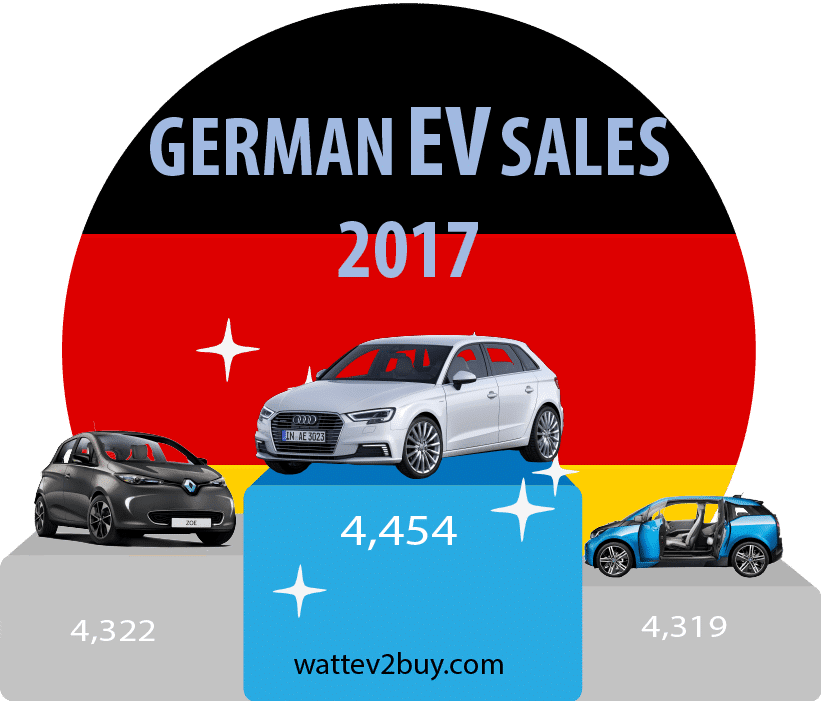
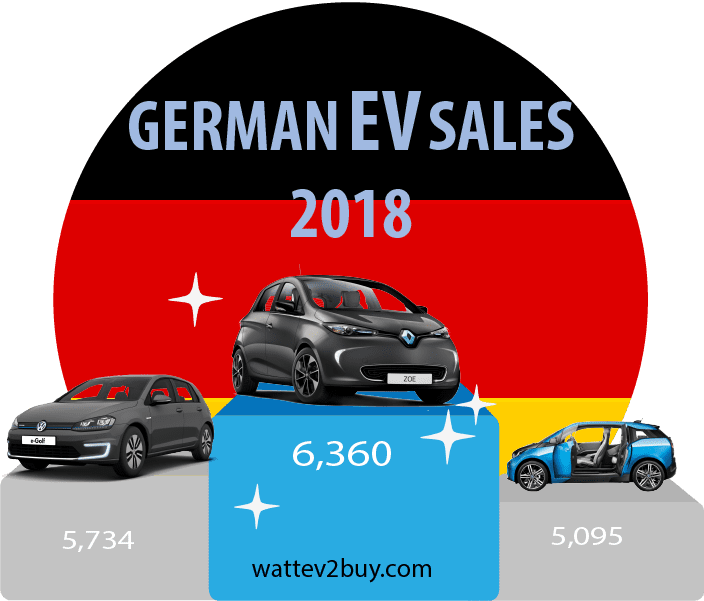
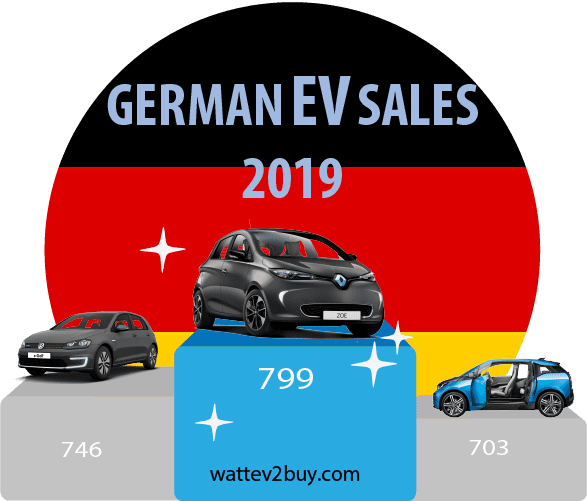
GERMAN EV SALES: JANUARY 2019
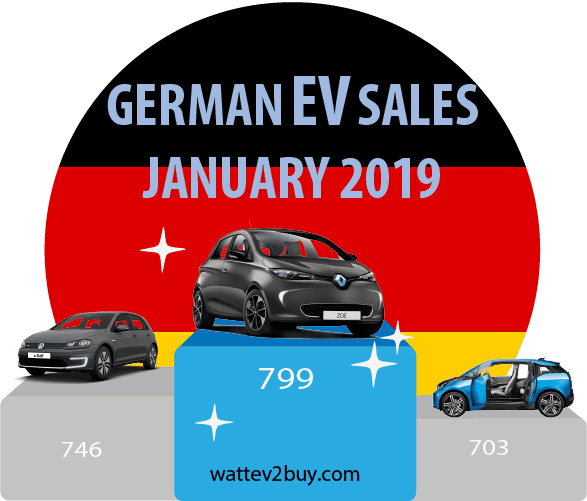
RANKING TOP GERMAN EV MODELS: JANUARY 2019
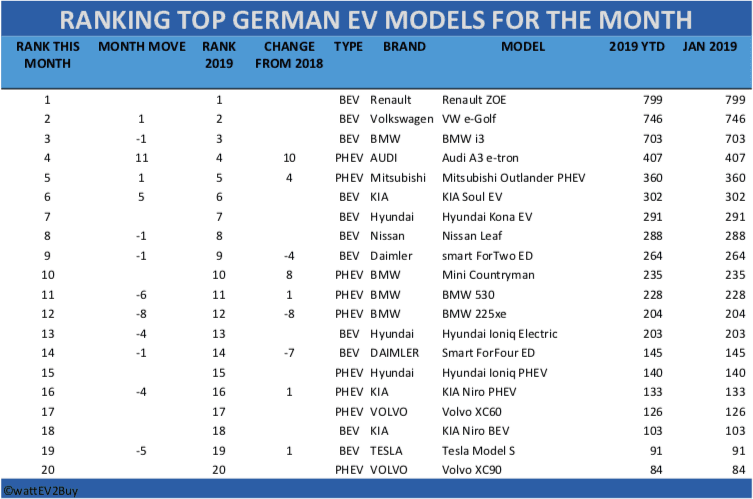
GERMAN EV SALES HISTORY
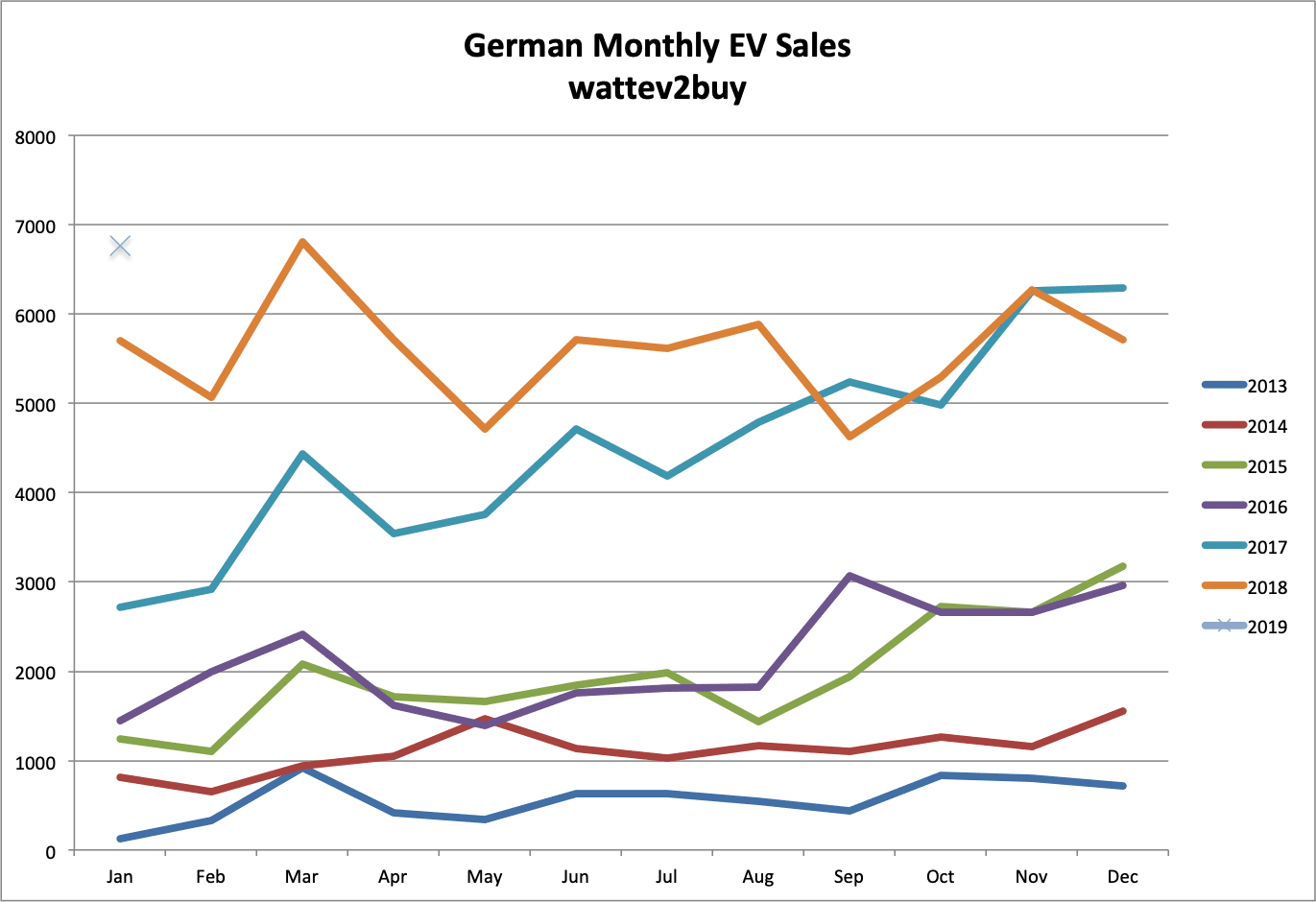
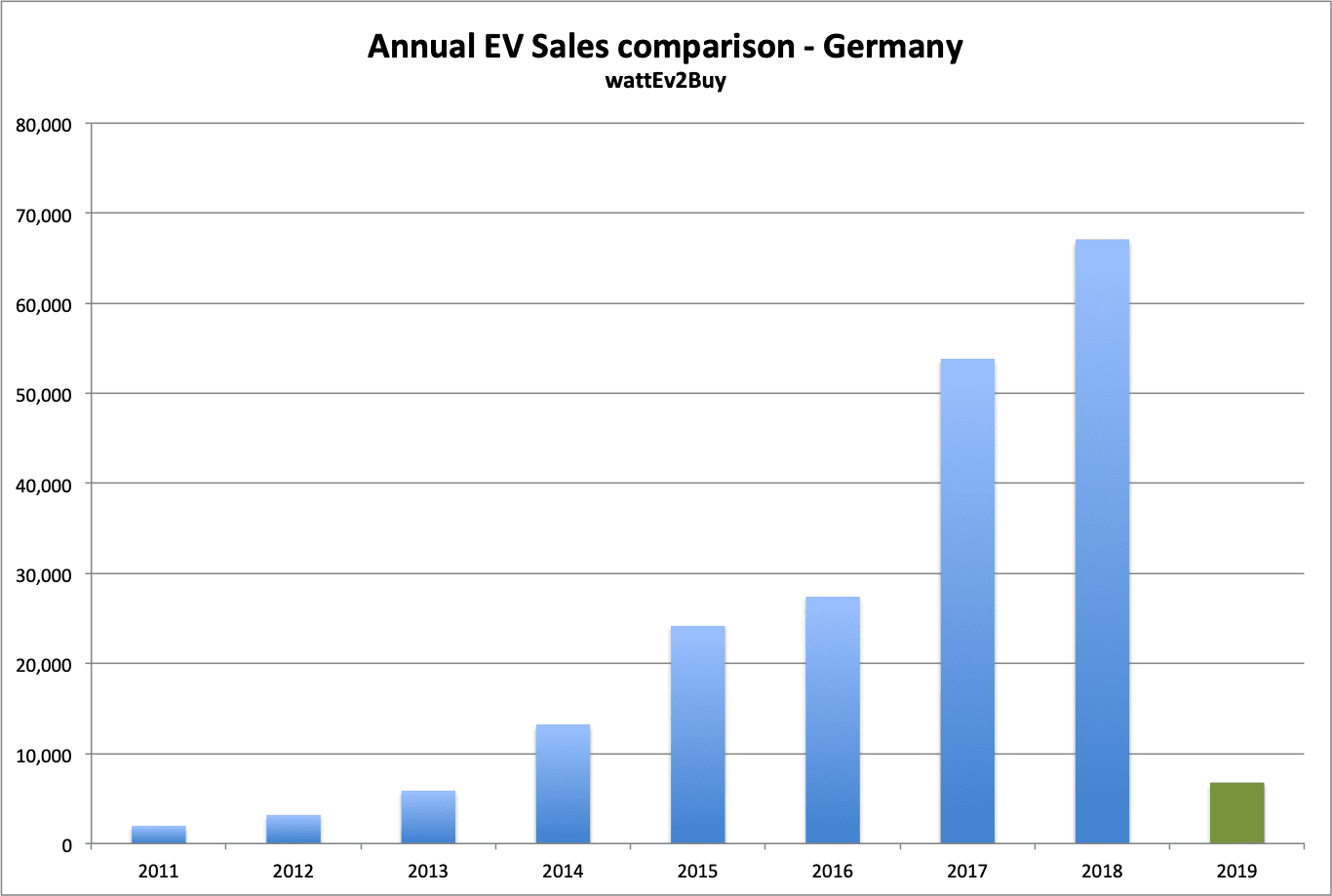
GERMAN EV SALES IN THE NEWS
2018 Week 7 - EV buyers face long waiting times
According to a survey by the German publication “Automobilwoche” the success of electric cars in Germany seems to be the technologies biggest risk as prospective buyers now face delivery times that can have them waiting as long as a year for their new EV. The problem is not isolated to buyers of imported vehicles only but also local brands such as Volkswagen where buyers have to wait until October 2018 for delivery of e new e-Golf purchased today. Smart CEO Annette Winkler said that the increase in demand is much stronger and faster than could have expected and planned for with the companies suppliers, resulting in buyers only receiving their new Smart by the end of 2018 or early 2019.
To compensate for the increased demand Volkswagen has introduced a second shift at its Dresden plant as e-up! buyers wait for five to six months. According to the survey, the waiting period for a Hyundai Ioniq EV is up to 12 months, the 2018 Nissan Leaf is around ten months, and six to seven months for the Peugeot ION and Kia Soul EV. Renault Zoe buyers only have to wait four months while the waiting list for a BMW i3 is the shortest at two to three months. The problem is not isolated to private buyers but fleet buyers are also affected. The software giant SAP wants to be carbon neutral in 2025 and is currently expanding its e-fleet. SAP manager Marcus Wagner told “Automobilwoche”: “If you want to buy a full electric in February 2018, you will get almost none.” It seems to me the problem is not isolated to buyers which place pre-orders for new EVs like the Tesla Model 3.
I hosted the friendly team of EV-Volumes last week in Cape Town and from the comments over a glass of beautiful Cape wine we concluded that the EV market has reached its tipping point.

2017 Week 48 - German removes Tesla from subsidy list
On the flip side of the coin, Germany has removed Tesla from its list of vehicles qualifying for EV subsidies. The reasoning by the German Government that the Tesla Model S and X are too expensive as customers are not able to order the base version with extra features pushing the car above the €60k threshold. In the USA the future of the $7.5k federal tax credit for EVs is still uncertain with amendments to the tax bill still putting the incentive at risk despite earlier changes removing the outright scrapping of it.
2017 Week 34 - German Self-driving rules
Germany which has adopted its self-driving law in May 2017 this week announced guidelines for autonomous vehicle software. According to Reuter’s the ethical guidelines of the rules is set to protect people at all cost above property or animals. Autonomous vehicle software is not to determine between sex, health or age of a person in deciding what to do in the event of avoiding an accident.
2017 Week 33 - Merkel doubts auto companies EV innovation
German Chancellor Angela Merkel this week reaffirmed her commitment to having 1 million EVs on the country’s road by 2020. In an interview with German YouTuber Lisa Sophie, Merkel reportedly said that the country has not abandoned its commitment to its one million EV goal by 2020 but that not enough was done up to now, signaling a possible ramp-up of the country’s efforts in the next two years. Merkel did not accept all of the blame for the slow pace but laid some of the responsibility on automakers which she doubts were sufficiently innovative enough to progress the technology.
Merkel will meet with local government officials on the 4th of Septemeber to discuss emission targets and indicated that around $600 million would be made available to improve urban transport infrastructure.
Although EV sales in Germany skyrocketed this year, the country so far only has just over 100,000 EVs registered. German EV sales data released this week showed that at the end of July nearly as much EVs have been sold as for the whole of 2016. EV sales in Germany are expected to continue its strong performance, supported by initiatives such as that of Nissan which announced that it would offer a scrapping bonus of EUR2000 ($2,348) for buyers converting from ICE vehicles to its Nissan Leaf or a Nissan e-NV200.
In related news, Chinese EV sales data showed a 30% rise in EV sales for the year to date over the corresponding period in 2016. It’s wattEV2buy’s forecast that China will reach its target of 2 million registered EVs by 2020, and even exceed it as more models become available in the next two years. China is already standing more than 800,000 units of which 200,000 has been registered this year alone. It is our belief that the Chinese EV market is set to reach its one million EV milestone by the end of the year, in light of historically stronger second half sales.

2017 Week 32 - Germany to electrify Autobahn
Electric vehicles have developed tremendously in recent times, battery capacity and range have increased exponentially, and new investors are flooding into the market to get their share of the pie. The logical question is, where to next with this amazing technology?
Siemens and Germany have announced their collaboration the eHighway which is being constructed on a 10 km strip of the Autobahn close to the Frankfurt Airport in Germany. Though 10km (6miles) doesn’t seem like much, this could be a groundbreaking step for electric trucks in the future. eHighways could cut input costs for companies dramatically and could make the price of goods independent from oil prices.
To learn more about eHighways check out this video.
2017 Week 29 - EV Sales up in key markets
As the June EV sales data are being released, we have been able to create half-year reports for the key markets. Most of the of the key markets are showing exceptional growth in the first half of 2017. The increased sales are helped with the release of a slew of new models. As many as 20 new models have entered the Chinese EV market since June 2016 while most European markets saw ten or more new models. Some of the highlights are:
Germany – Year on Year growth of 104% or 11,000 units
USA – Year on Year growth of 39% or 25,000 units – see report
China – Year on Year growth of 35.8% or 44,000 units – see report
Norway – Year on Year growth of 20.6% or 4,600 units – see report
Sweden – Year on Year growth of 35.2% or 2,100 units – see report
France – Year on Year growth of 1.4% or 260 units
Netherlands – Year on Year growth of -14.2% or shrinking with 656 units
Smaller markets such as Spain has also shown growth of 101% and Italy 53%. We will be releasing detailed reports on all the Top 10 countries in the following two weeks.
2017 Week 24 - Sales Update: Germany and China
Germany: EV Sales keep powering ahead EV sales now nearly double that of the same period 2016. Total sales for the year to date stands at just over 17,000 units compared to 8,800 at May 2016. May 2017 EV sales in Germany was nearly treble that of May 2016 as 3,754 EV were added to the fleet compared to only 1,392 units in May 2016.
China: Chinese EV sales are recovering at a decent pace. EV sales in May showed a continuation of the trend started in March 2017. Chinese EV sales are now more than 50% higher than the same period a year ago. May EV sales of over 40,000 units bring the year-to-date sales to 134,000 units. Smaller cars like the Zhidou D2 and BAIC E180 still rule the roost. The new Chery eQ1 has also made the Top 20 list for the month.
2017 Week 24 - China not relaxing EV requirments
In Week 22 we reported on concessions agreed between the German Chancellor and Chinese Premier to delay strict ZEV type mandates to allow German automakers some breathing space. This week the Chinese Legislative Affairs Office published draft legislation ignoring the concessions. The proposed legislation will require automakers to sell new energy vehicles equivalent to 8% of total sales in2018, increasing by 2% annually to reach 12% by 2020. Chinese lawmakers and the Calfornia Resource Board met in China last week to expand cooperation on accelerating the deployment of zero-emission vehicles. The delegation also included officials from Chinese vehicle and battery manufacturers such as BYD, BAIC, Great Wall, Geely, Dongfeng, Yangtze Motors and a half dozen other vehicle and battery companies.
2017 Week 22 - Germany benefits as CHINA delays EV quota by a year
Chinese Premier, Li Keqiang, and German Chancellor, Angela Merkel met on Thursday to discuss various trade issues between the two countries, amongst others the impact of the China’s ZEV-like quota on German automaker’s expansion plans in the Asian country. The Chinese Government proposed that car manufacturer had to achieve a level of 8% EV sales by 2018. Although not confirmed Reuters on Friday reported that the Chinese Government agreed to delay the quota to 2019 for German companies but that they should ramp up EV deliveries at a later date.
2016 Week 48 - Germany to pilot new Charging Service from BMW
BMW unveiled its new BMW Digital Charging Service (DCS) optimizes charging technology for the BMW i and BMW iPerformance vehicles through the BMW i Wallbox. The DCS platform provides autonomous and intelligent charging optimization through tariff and solar vehicle charging. The DCS service will initially be available for the German and Dutch markets from early 2017.
2016 Week 40 - German Charging Standards
Reuters reported that the Germany utility RWE this week spun out its renewable energy business into a separate vehicle, Innogy via a listing on the Deutsche Bourse. The new company aims to focus on the US charging station network. The CEO announced that the agreement was reached with the Californian regulators to accept German car charging standards.
Top 5 EV News Week 32 2020
Top 5 EV News Week 32 2020 | Cadillac Lyriq unveiled. Yet another Chinese EV startup IPO. Three new EV models launched this week.
Top 5 EV News Week 31 2020
Top 5 EV News Week 31 2020 | Successful IPO for CHJ Auto, Kandi finally enters the USA, Mitsubishi pays the cost for failing EV strategy.
Top 5 EV News Week 30 2020
Top 5 EV News Week 30 2020 | Chengdu Auto Show, Hozon Neta IPO, VW invest in China, eVito Tourer for sale



